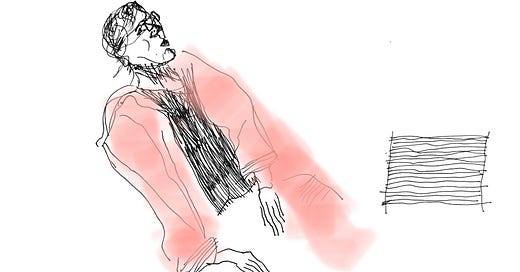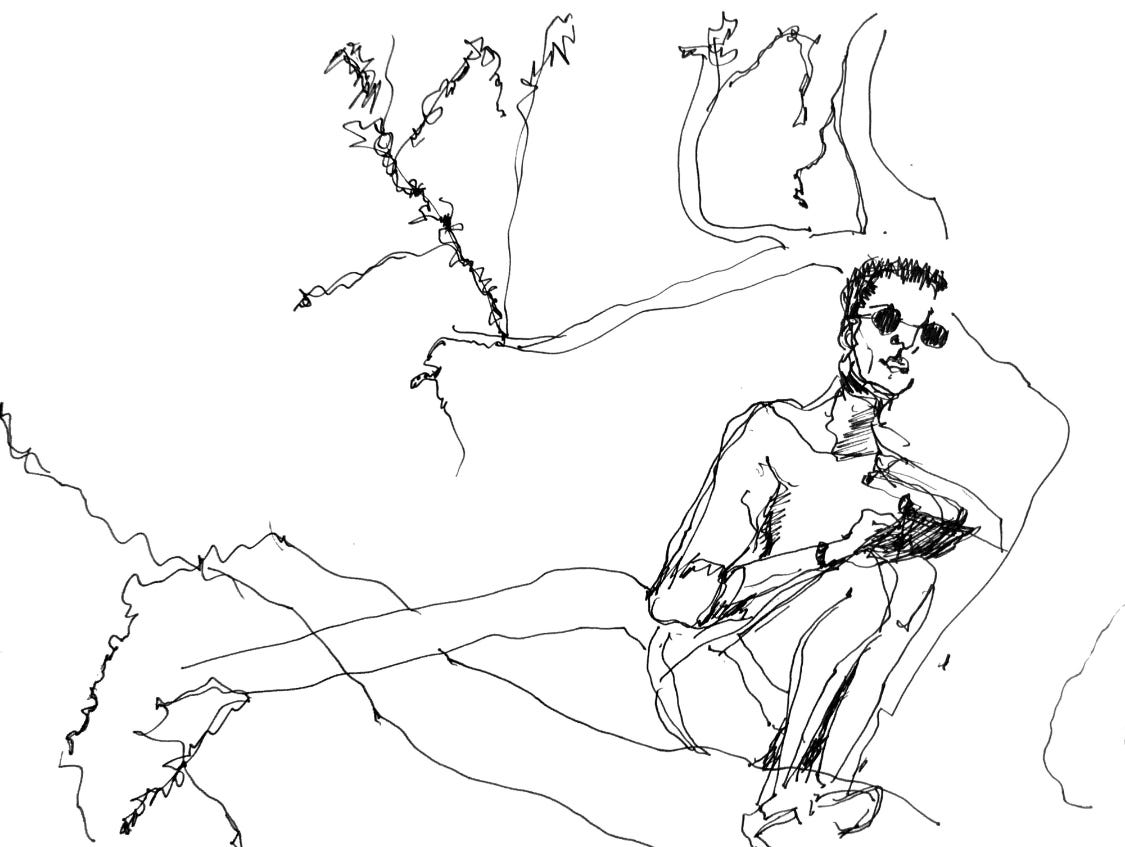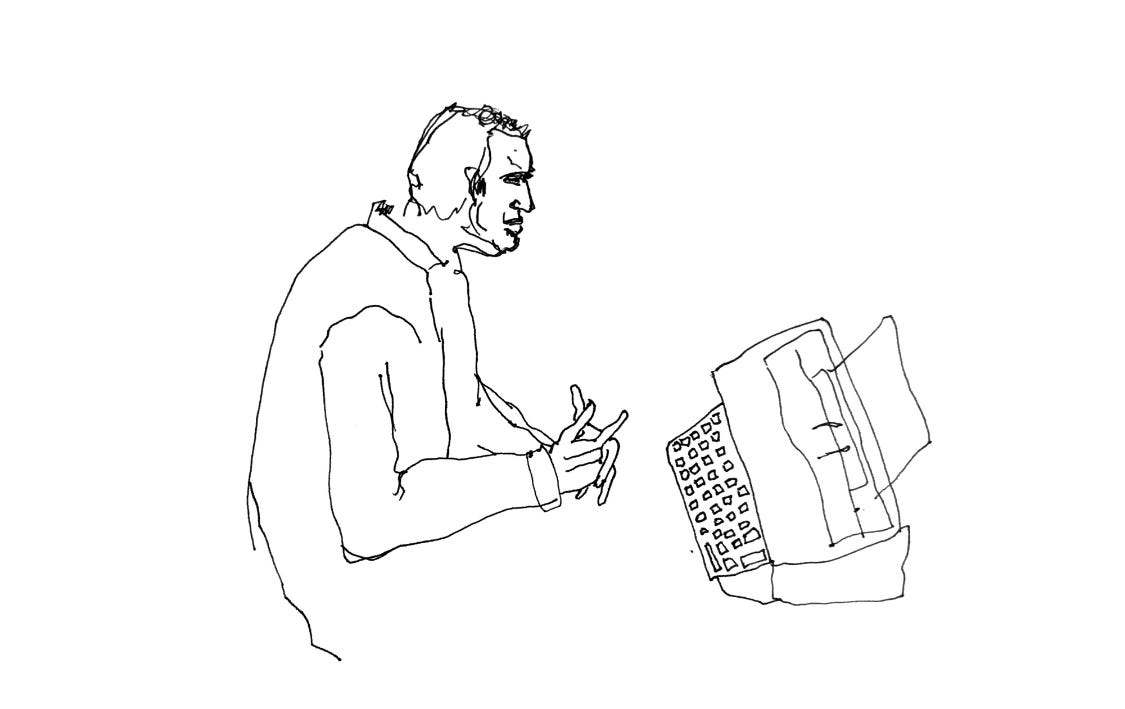I try to get out of writing this Substack every week. It would be so much easier not to do it. But every time I manage to write it (every week since early September so far) I tell myself to remind myself next time that it can be done. But I seem to have weekly amnesia—by the time the next Monday rolls around, I forget that just writing is not as hard as I make it up to be. The self-hampering thoughts making eternal revolutions in my head (Why am I doing this? Does anyone even care? What do I have to say that hasn’t been said before?) make it impossible to write well until I reach that moment, usually quite close to my deadline, when I realize they are just thoughts and that writing, while painful, is part of my life.
In the PBS drama The Durrells in Corfu (2016) Lawrence Durrell—the eldest of the famous Durrell children, including Gerald the zoologist—is struggling to write his first novel. In one scene, he takes to the ancient olive trees with his miniature typewriter. The height and perspective afforded from his perch do not help. “GAHH! Why can’t I think of anything interesting?” he wails. On one occasion he tries writing at a desk, but one precariously half-submerged in the Ionian. He is invariably clothed in a rather skimpy polka-dotted robe. The show’s timeline sees Larry achieving only modest success, but by the 1950s he will be regarded as one of the best writers in the English-speaking world, and will inspire W. Somerset Maugham’s character Larry Darrell, the hero of The Razor’s Edge. But nothing depicts the stage between the young writer’s early struggles and the adult’s great success. How does Durrell get from A to B?
Speaking of robe-wearing writers (those who convince themselves they need to be wearing a particular garment in order to write, among whom I now sadly count myself a member) there is of course Grady Tripp of The Wonder Boys (of Michael Chabon’s book and the 2000 film adaption), pictured above; the fictional but convincing New England liberal arts creative writing teacher toiling at an endless manuscript, the long-awaited sequel to his successful first novel. The dirty pink robe, a remnant of an ex-wife, is endearing but we learn it is not actually helpful or necessary to writing. With the robe and all it represents abandoned (for example the writer’s false sense that everything has to be just so for the writing to get done) Grady is finally able to think clearly.
And then there is Charlie Kaufman. Perhaps the most self-flagellating and self-impeding writer of the list. His character played by Nicholas Cage in Adaptation (2002) goes from possibly figuring out the key to the universe (see tape-recorder scene) to staring at the distressingly blank page thinking about what he’ll have for breakfast. “To begin. To begin. How to start. I’m hungry. I should get coffee. Coffee would help me think. But I should write something first then reward myself with coffee. Coffee and a muffin. Okay, so I need to establish the themes. Maybe banana nut. That’s a good muffin.” Of course, Charlie’s unmethodical approach to writing turns out to be vastly preferable to his brother Donald’s trite formulas. Yes, Charlie’s life is more painful, sadder, and lonelier, but at least his writing escapes cliché.
And here we are at the end of the post! It is done. It can be done.
But first I’m going to read this post to my mom. As I read aloud, I discover it’s not really as good as I thought it was. Before she says anything, I know what she is going to say. “It’s pretty good. But aren’t you being a little expedient? The dislike of writing is perennial—and I’m not talking about the people who don’t write, who couldn’t care less, but the people for whom writing is hard. Your Charlie Kaufmans. Writers are trying to think things through. It’s a quest for self-knowledge. Every week you say, I hate writing, but isn’t that because you’re afraid, or you're failing, to submit your thoughts to examination? Put the scalpel to your fears.”
Goddamn it. I feel like I overcame obstacles to succeed in the end. But maybe the obstacles I gave myself were too small.
Why does a writer always have to go back and do a better job? Why does a writer always have to confront what a writer is most ashamed of, most unwilling to say out loud?
Mom says, “write that down.” I’ll tell you what I’m going to write down. It was done and now it’s messy. It was done before. I hate writing. I don’t why you do this to me, why I do this to myself. I’m lying face-down on the floor, next to the dog. In my robe.
This is the sentence I said verbatim to my mom: I want you to write this with your own hands and I will pay you hard cash. She looked at me with her fathom-deep eyes, the eyes of an old writer.







